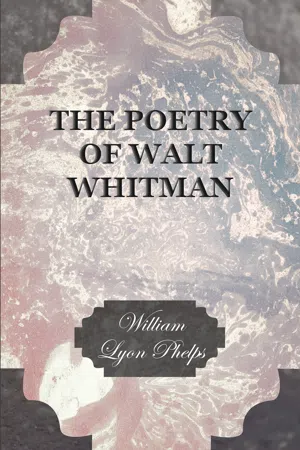![]()
THE POETRY OF WALT WHITMAN
Camden, Oct. 14, 1880.
Dear Tom: I got home all safe -We stopped a day & a night at Niagara & had a first rate time-- Started the next morning early in an easy comfortable palace car & went on like a streak through New York & Pennsylvania-got into Philadelphia after 11 at night- (we were an hour late) -but the city looked bright & all alive. O I felt as fresh as a lark-I am well, my summer in Canada has done me great good-it is not only the fine country & climate there, but I found such good friends, good quarters, good grub, & everything that could make a man happy-The last five days I have been down on a jaunt to the sea-shore. . . I sat hours enjoying it, for it suits me-I was born & brought up near the sea, & I could listen forever to the hoarse music of the surf-Tom I got your paper & handbill, good for you, boy-believe me I was pleased to know you won.
Whitman was always cheerful, always the optimist, always the affirmer of life, and the believer in it. He regarded mere animal existence as a huge asset, and conscious living as a continuous joy. He had as little of Mark Twain's pessimism as of his humour; the only point where these representative Americans came in contact was their faith in the universal principle of Democracy.
Who is America's foremost poet? It would be impossible to obtain a majority on a secret ballot for any one. Poe, Emerson, Longfellow, Whittier, Lowell, Whitman have many supporters. Our most popular poet is of course Longfellow; but the greatest? I cannot tell. Emerson and Whitman are the most unconventional, the most free of tradition.
John Burroughs, the faithful disciple of old Walt, divided all poets into two classes-Primary and Secondary. He declared emphatically that Whitman was a greater poet than Tennyson, because Tennyson was a secondary man, and Whitman was primary. He meant that Tennyson followed in broad highways, whereas Whitman blazed a trail. However this may be, I do not believe that Whitman was a greater poet than Tennyson, for the simple reason that his poetry is not so good as Tennyson's.
Yet the reputation of Walt Whitman was never so high as it is now. There were two American centenaries in the year 1919; homage was paid to Lowell and to Whitman. But the latter poet was more widely and more vigorously applauded. There are still many sceptics, many avowed antagonists; but we shall never be rid of him. We cannot say, as some tried to say of a greater poet with the same initials, William Wordsworth,
Here lies W. W.
Who no more will trouble you, trouble you,
for Whitman will trouble us to the end of our lives, and cannot be dismissed with a Podsnappian gesture.
The history of his reputation demands a volume by itself. It began with Leaves of Grass, in 1855. That was a notable year in poetry, for it saw also the appearance of Tennyson's Maud, Browning's Men and Women, Longfellow's Hiawatha. Maud and Hiawatha received much ridicule, and Men and Women received silence. Today all these poems are very much alive.
Whitman's admiration of other poets was sufficiently eclectic. His roll-call of the "mighty ones" is as follows: Job, Homer, Aeschylus, Dante, Shakespeare, Tennyson, Emerson.
What I shall say about Whitman will please nobody; for I am neither among the worshippers nor the scorners. To me he is neither one-of-the-greatest-poets-of-all-time nor is he a charlatan. I refuse to become excited or polemical in this matter. Whitman needs no defence and attacks cannot hurt him.
It was during the 'seventies that the battle raged most fiercely. To some enthusiasts, Whitman was in the front row with Homer and Shakespeare; to other men he was an unclean boor who should be summarily expelled into the outer darkness. Just when the fight was hottest, an obscure young Scot by the name of Robert Louis Stevenson published an essay called The Gospel According to Walt Whitman (1878) which in 1923 seems still to be the best appraisal. Let me quote the first paragraph
Of late years the name of Walt Whitman has been a good deal bandied about in books and magazines. It has become familiar both in good and ill repute. His works have been largely bespattered with praise by his admirers, and cruelly mauled and mangled by irreverent enemies. Now, whether his poetry is good or bad as poetry, is a matter that may admit of a difference of opinion without alienating those who differ. We could not keep the peace with a man who should put forward claims to taste and yet depreciate the choruses in Samson Agonistes; but I think we may shake hands with one who sees no more in Walt Whitman's volume from a literary point of view, than a farrago of ...
